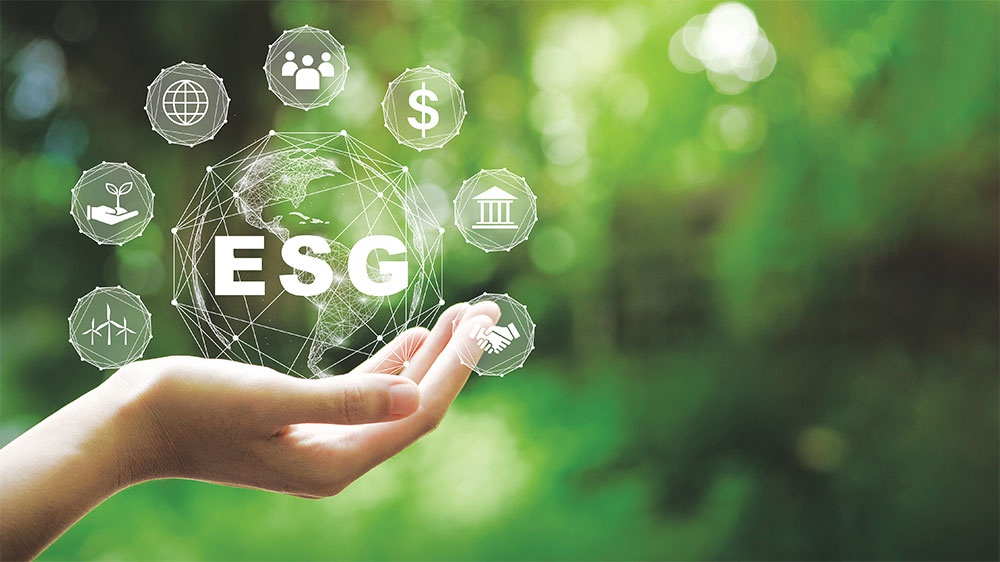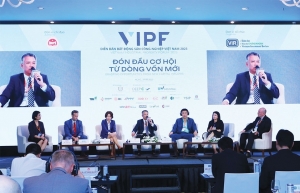Consideration of ESG tools build up steam
Bamboo Capital Group last week announced a partnership with data solutions company STACS to utilise its platform ESGpedia, which supports corporate sustainability and ESG reporting for businesses in Vietnam. Through the partnership, Bamboo will integrate with ESGpedia to help companies, especially those new to ESG reporting and sustainability, easily calculate their Scope 1 and 2 carbon emissions.
 |
| Consideration of ESG tools build up steam, illustration photo/ Source: Shutterstock |
Andy Tan, group strategy director at Bamboo Capital, said that while there is an increasing trend of ESG awareness and requirements in Vietnam today, many businesses are lacking the expertise and resources to begin.
“Our partnership with ESGpedia will allow companies to gain an understanding of their carbon footprint and current sustainability standing in a simple and guided manner, and ultimately lower the barrier of entry to kickstart and set the necessary foundation for businesses to embark on decarbonisation and corporate sustainability,” Tan said.
Renewable energy is another focus of the partnership. Renewable energy certificates offer companies in Vietnam the opportunity to reduce their Scope 2 carbon emissions from electricity use.
Through the partnership, Bamboo Capital will utilise ESGpedia to promote greater transparency of the lifecycle of certificates, by immutably recording all attributes, including the transaction and ownership details of each certificate and more besides.
Benjamin Soh, founder and managing director at STACS, said, “Corporate sustainability involves every participant along the entire value chain, from small companies to large corporates and financial institutions. However, this is often not easy due to the lack of available tools and data for companies embarking on this journey.”
“We aim to provide a seamless and digital end-to-end experience for all companies in Vietnam and across ASEAN to now be able to gain awareness of their sustainability profile, and take steps to manage greenhouse gas emissions through active decarbonisation strategies and energy transition measures.”
In the same way, fast-moving consumer goods company Unilever is committed to sustainable development in various ways.
“We are paying a lot of attention to the health of our community, especially female employees. We are developing a new definition of green labour to take care of the women who collect rubbish and bottles, for example. They do the hard work, without insurance, but we can give them more equipment and labour protection,” said Le Thi Hong Nhi, head of Business Sustainability, External Affairs, and Communication at Unilever Vietnam.
Meanwhile, the Ministry of Planning and Investment (MPI) is building 10 sets of tools to measure, evaluate, and recognise sustainable businesses.
“The development of such tools not only ensures to be appropriate to the characteristics and conditions of Vietnamese enterprises, but also compliance with applicable global standards and methodologies,” said Deputy Minister of Planning and Investment Nguyen Thi Bich Ngoc.
“This is critical, especially in the context that Vietnamese businesses are aware and can take the first steps to apply ESG practices, towards the goal of sustainable development.”
Three sets of tools to assess sustainable business practices include toolkits for the overview of ESG practices, for a circular economy practice assessment, and for overarching business practice assessment.
“They are expected to be initially completed in the next few months, and relevant ministries, agencies, and experts will be consulted before it is published and applied,” the deputy minister said.
At the same time, the MPI is also building a set of scientific criteria for the national green classification, which will be the foundation to encourage suitable projects.
At last week’s Vietnam Corporate Sustainability Forum 2023 in Hanoi, Nguyen Duc Hien, Deputy Head of the Central Economic Commission, said that it is working with authorities at all levels to propose mechanisms for green growth for 2026-2030.
Hien added that also on the table are ideas surrounding preferential policies; encouraging the private sector to invest in the green and circular economy; sustainable development mechanisms; and policies for resource mobilisation and allocation.
“To contribute to the promotion of green growth and the realisation of Vietnam’s international commitments on the UN’s Sustainable Development Goals and climate change, we suggested policy development to encourage the private sector to take the lead in greening economic sectors,” Hien said.
It is necessary to promote the private sector to carry out research and development, innovation, and digital transformation, to apply the achievements of the Fourth Industrial Revolution and green recovery in all industries and fields, Hien added.
“The private sector should become the core in proactively participating in new generation free trade agreements, in association with greening and emission reduction of greenhouse gas,” Hien highlighted.
 | ESG becoming a benchmark for IZs Key stakeholders are signalling a paradigm shift in Vietnam’s industrial real estate, spotlighting environment, social, and corporate governance as the new cornerstone for future growth. |
What the stars mean:
★ Poor ★ ★ Promising ★★★ Good ★★★★ Very good ★★★★★ Exceptional
Related Contents
Latest News
More News
- Masan Consumer names new deputy CEO to drive foods and beverages growth (February 23, 2026 | 20:52)
- Myriad risks ahead, but ones Vietnam can confront (February 20, 2026 | 15:02)
- Vietnam making the leap into AI and semiconductors (February 20, 2026 | 09:37)
- Funding must be activated for semiconductor success (February 20, 2026 | 09:20)
- Resilience as new benchmark for smarter infrastructure (February 19, 2026 | 20:35)
- A golden time to shine within ASEAN (February 19, 2026 | 20:22)
- Vietnam’s pivotal year for advancing sustainability (February 19, 2026 | 08:44)
- Strengthening the core role of industry and trade (February 19, 2026 | 08:35)
- Future orientations for healthcare improvements (February 19, 2026 | 08:29)
- Infrastructure orientations suitable for a new chapter (February 19, 2026 | 08:15)

 Tag:
Tag:



















 Mobile Version
Mobile Version